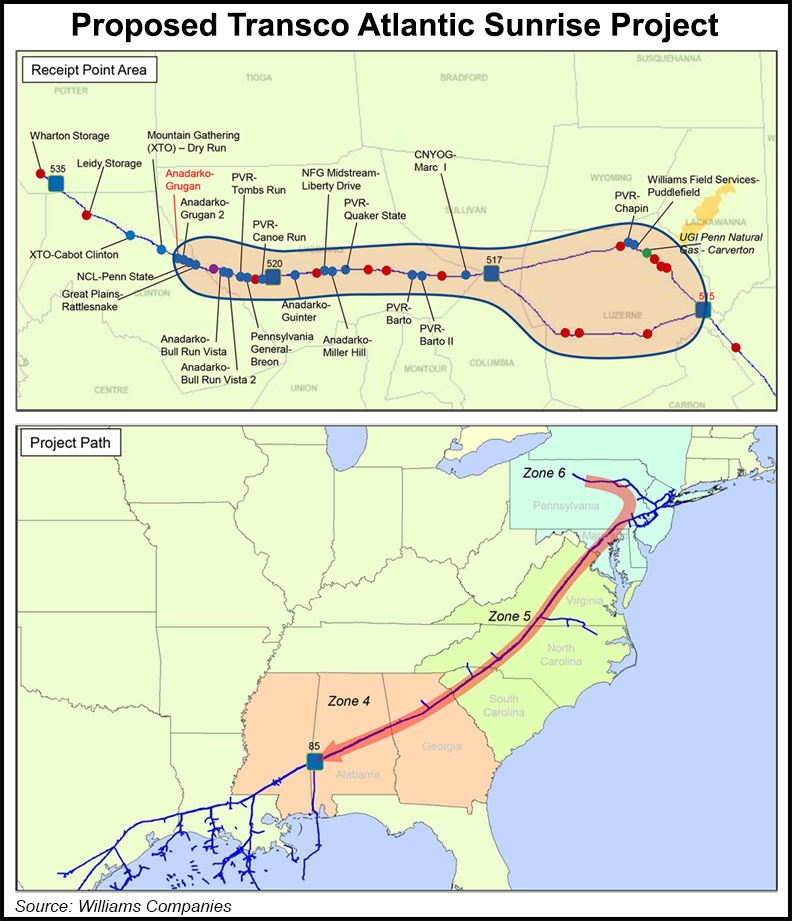Regulatory | Infrastructure | NGI All News Access | NGI The Weekly Gas Market Report
Pennsylvania Regulators Taking Final Steps on Key Atlantic Sunrise Permits
The Pennsylvania Department of Environmental Protection (DEP) is launching a public comment period on Saturday and will hold four public hearings next month on the earth disturbance and water-crossing permit applications submitted by Transcontinental Gas Pipe Line Co. LLC (Transco) for the Atlantic Sunrise natural gas pipeline project.

While the project still needs approvals in Maryland, Virginia and from other federal agencies, the Chapter 105 water obstruction and encroachment permits and the Chapter 102 erosion and sedimentation control general permit are considered the final crucial regulatory pieces for moving the pipeline forward.
Earlier this year, Williams CEO Alan Armstrong indicated that the Pennsylvania permits were the most significant approvals left. He said at the time, however, that the state has been cooperative and on schedule throughout the process, pointing to its February approvals of the Mariner East 2 and PennEast pipelines.
The nearly 200-mile, 1.7 Bcf/d project would cross 10 counties in the state and three DEP regions to deliver stranded Marcellus Shale gas in Northeast Pennsylvania to markets in the Mid-Atlantic and Southeast. About 184 miles of pipe would be laid in the state along with looping, pipeline replacement and equipment upgrades elsewhere to expand Transco. DEP is currently undertaking a technical review to ensure the applications meet statutory and regulatory requirements.
The Federal Energy Regulatory Commission approved the project in February just in time before losing its quorum. That came as relief to producers such as Cabot Oil & Gas Corp., which has 1 Bcf/d alone contracted on the system, as operators have continued to battle low regional prices on a lack of takeaway.
Speaking earlier this week at Kallanish Commodities’ 2017 North America Oil & Gas conference in Pittsburgh, Cabot spokesman George Stark said that one of the reasons activity has not bounced back as quickly in the Marcellus Shale’s northern tier is because there’s not enough pipeline capacity.
He pointed to the fact that four operators — Chesapeake Energy Corp., Southwestern Energy Co., Chief Oil & Gas LLC and Cabot — remain the only truly dominant operators in the area as a result.
Atlantic Sunrise, which is targeting a mid-2018 in-service date, is considered critically important for Cabot. The 650 MMcf/d Constitution pipeline is tied up in federal court after New York state denied a key water quality certification last year. Cabot has 500 MMcf/d secured on that project if it ever comes to fruition.
DEP issued the Section 401 water quality certification required by the federal Clean Water Act for the pipeline last year. The upcoming hearings are to focus on the water-crossing and earth disturbance permit applications, which are required for projects in or near waterways, including wetlands, and for earth moving activities associated with oil and gas development.
“We want to provide the public, especially those living near the pipeline route, with the opportunity to review permit applications and provide thoughtful, critical and constructive feedback to aid in our technical review,” said DEP Secretary Patrick McDonnell.
Four public hearings are scheduled in Wyoming, Lancaster, Columbia and Lebanon counties from June 12-14. Notices for the permits are to be published in the Pennsylvania Bulletin on Saturday, and DEP said it would accept public comments through June 26. More information about the applications and the project can be found on the agency’s website.
© 2024 Natural Gas Intelligence. All rights reserved.
ISSN © 1532-1231 | ISSN © 2577-9877 | ISSN © 1532-1266 |
